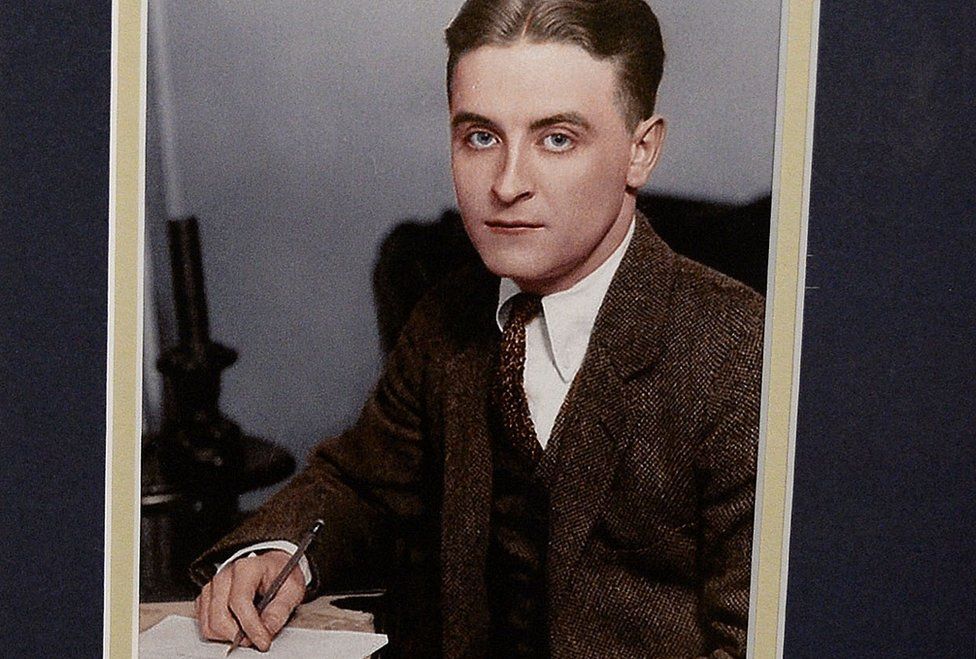The long wait for F Scott Fitzgerald's 'lost stories'
- Published

News that a collection of previously unpublished stories by the author F Scott Fitzgerald will be released next year has got fans excited. Why haven't they been published before, and what are they like?
F Scott Fitzgerald's stories of romance and personal tragedy in 1920s America have led him to be regarded as one of the greatest authors of the 20th Century. But the man behind The Great Gatsby was less revered in his lifetime and in later years struggled to get into print.
Some of his short stories were deemed too controversial for publication and several of these are included in an upcoming book, I'd Die For You and Other Lost Stories. Others in the collection were accepted by magazines but never printed, its publisher Scribner says.
All have remained out of sight for almost 80 years; tucked away in library archives and private collections.
But apart from the title story, I'd Die for You, the contents remain a secret.
"I think they are doing a good job at creating a lot of mystery around it," says Kirk Curnutt, English professor and vice-president of the F Scott Fitzgerald Society.
"People have always wondered what was still around from Fitzgerald that they might not know about.
"I think there will be a tremendous amount of interest in what's inside."
The relationship between Fitzgerald and his wife, Zelda, pictured with daughter Frances, has added to the fascination with the author
Fitzgerald himself described the tale that gives its title to the new collection as a "suicide story".
It revolves around a movie star and film crew in North Carolina's Smoky Mountains, Scribner says, and draws on the writer's own time in the region - a period when he when he was struggling with alcoholism and his wife, Zelda, was in a sanatorium nearby.
But for now, experts can only speculate about which of the other unpublished Fitzgerald tales known to exist will see the light of day.
A number of stories, written by hand in pencil, have been sitting in the vast Fitzgerald archives donated to Princeton University by the writer's daughter in the 1950s.
Andrew Gulli, editor of The Strand magazine, believes he read many that will be included in the new anthology when selecting a previously unseen Fitzgerald work, Temperature, to publish on the magazine's pages in 2015.
Reading some of the stories from Princeton archives was "very exciting," he recalls.
The F Scott Fitzgerald Papers are held in the Rare Books and Special Collections departments at Princeton University Library
Among the stories he suspects will feature are Offside Play, about a football player in Connecticut who gets caught up in illegal activity, and The Pearl and the Fur, part of a series about a teenage girl called Gwen and her single father.
Scholars are reluctant to annoy Fitzgerald's estate by revealing the plots of his unpublished work, but the original transcripts of other stories in the Gwen series are known to have contained sexual innuendo and profanity that editors of the time attempted to censor.
Gulli says he expects to see stories included with themes such as adultery, alcoholism and gambling, which would have offended sensibilities of the time. "But today we look at these things and it's nothing - anything goes."
It is not just the controversial subject matter, though, that stopped these stories from being published.
Fitzgerald left many projects unfinished, abandoning anything he did not consider his best, Gulli says, and his tumultuous lifestyle increasingly affected his writing.
By the 1930s, his heavy drinking was destroying his health and with Zelda frequently confined to specialist clinics for schizophrenia, he was struggling professionally as well as personally and financially.
Baz Luhrmann's film version of The Great Gatsby, staring Carey Mulligan as Daisy Buchanan, has added to interest in Fitzgerald's work
His writing - so associated with the Jazz Age of the 1920s - had also gone out of fashion in the aftermath of the Great Depression, says Kirk Curnutt.
"He was having a tremendously hard time selling stories," he says.
"His style was stereotyped, and his rich and extravagant language fell out of favour."
Ernest Hemingway, John Steinbeck and William Faulkner were more in tune with the times.
When Fitzgerald died in 1940, at the age of 44, he considered himself a failure. But in the following decades his novels The Great Gatsby and Tender is the Night came to be regarded as 20th Century classics.
So why weren't the stories published then? This has to do with the control exerted by Fitzgerald's family, estate and literary agents, according to Curnutt.
While the social taboos that had once prevented publication disappeared, it was feared readers would be prejudiced against the stories on the grounds that editors had once rejected them - so they were kept locked away.
Will this be the last Fitzgerald book? Maybe not.
Curnutt and Gulli cast doubt on the publisher's claims that it will include all the completed and unpublished stories.
"Frankly I don't think so," says Gulli. "I really don't think this is the last of it."
Follow @BBCNewsMagazine, external on Twitter and on Facebook, external